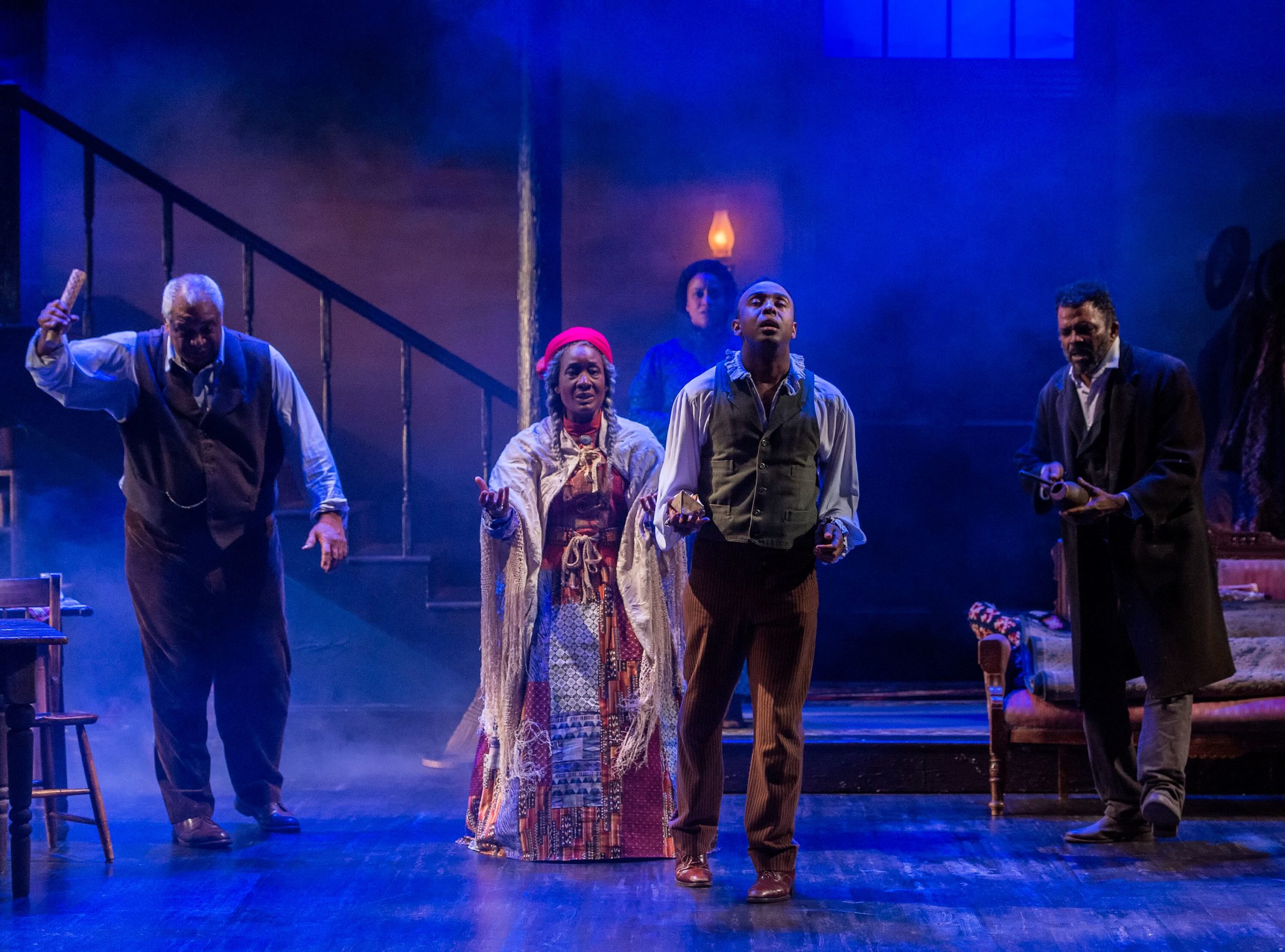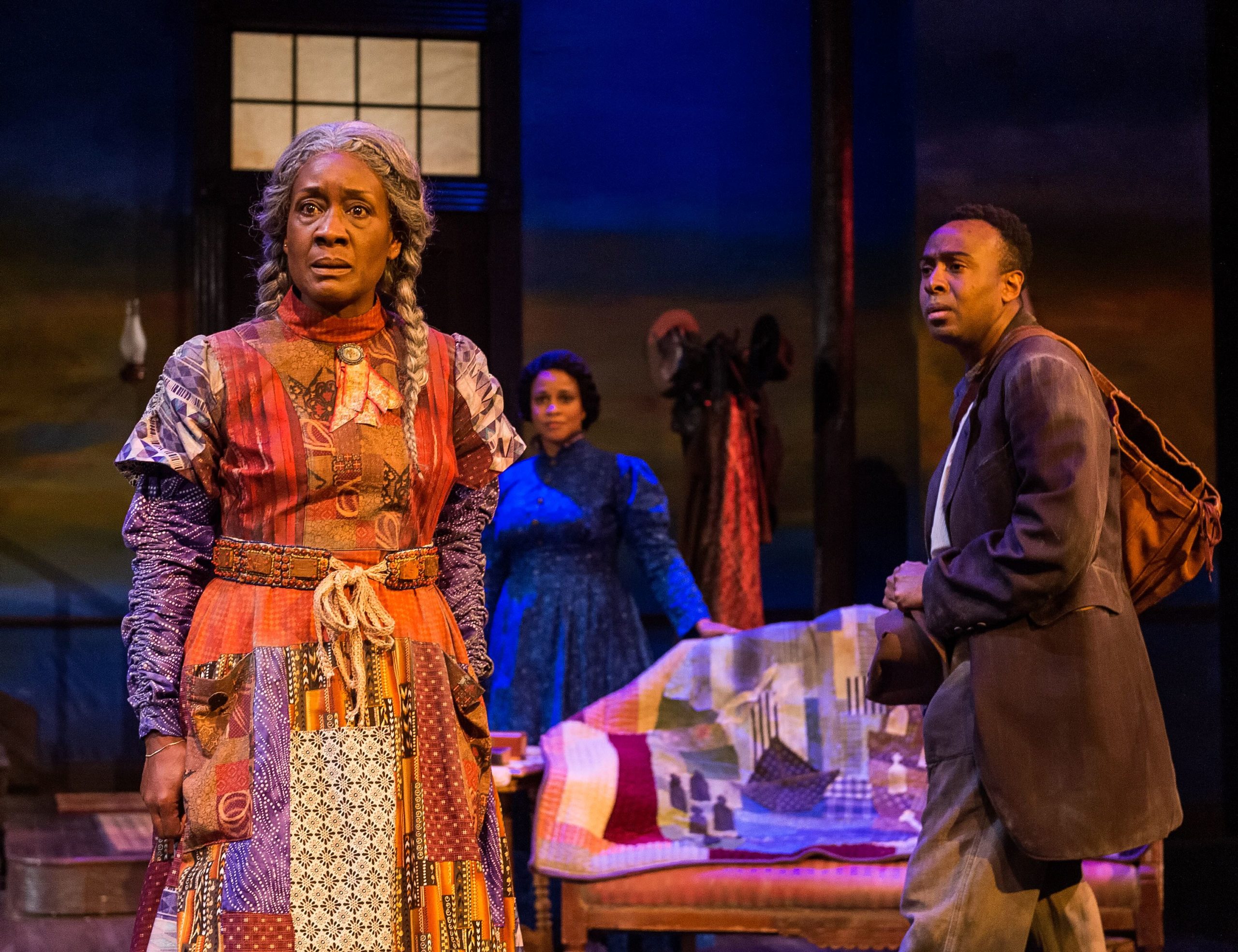
By May S. Ruiz
August Wilson, a Pulitzer Prize winning playwright, wrote a cycle of ten plays collectively called the ‘American Century Cycle’ which he set in a different decade of the 20th century. Each of the plays chronicles the complexities of the changing social and historical landscape of the African American experience over the course of a hundred years.
‘Gem of the Ocean,’ set in the Hill District of Pittsburgh, Pennsylvania, where Wilson grew up, is the first play in the cycle. It is the second production in A Noise Within’s 2019-2020 season and is on stage from September 22 to November 16. Directed by Gregg T. Daniel, it stars Veralyn Jones as Aunt Ester Tyler, Evan Lewis Smith as Citizen Barlow, Kevin Jackson as Solly Two Kings, Chuma Gault as Caesar Wilks, and Carolyn Ratteray as Black Mary Wilks.
Ratteray, a resident artist, was previously seen on the ANW stage when she portrayed the role of Beline in ‘The Imaginary Invalid.’ She graciously sits down with me an hour before rehearsal to talk about August Wilson, the play, and her role.
She begins with a revelation, “Gem of the Ocean’ holds a special position because it’s the first play in the ‘American Century Cycle’ even though he wrote it last. I love that he went back to the beginning, to the early 1900s – it takes place in 1904. He wrote in retrospect about how it all started. The date has significance as well. As you’ll read in the program, Aunt Ester is a 285 year-old spiritual advisor for the Hill District Community. If you do the math, the day she was born is 1619 which is the arrival of the first enslaved Africans on the American shores. As she explains in a beautiful monologue, Aunt Ester is a title that was handed down to her and whoever owns that title is the holder of the memories of the African people.
“Aunt Ester’s home address and house of sanctuary – 1839 Wylie Avenue – also has a significance. The year 1839 was the date of the enslaved people’s rebellion on La Amistad, the ship which traveled from West Africa to its final destination, which was supposed to have been Cuba. However, the enslaved people revolted and made the Spanish enslavers go back to Africa. Instead the Spaniards took the ship to the United States where they faced the Supreme Court to decide if they were, in fact, slaves or free people.
“August Wilson left gems of history within his text. By chronicling each play throughout the entire 1900s, he laid down the history of Africans, particularly Africans in the Americas. It was exciting to unpack everything during the first few days of table work. Coincidentally, 2019 marks the 400th anniversary of the first enslaved Africans’ arrival. How meaningful it is to stage this play now! Though I’ve seen some of his work, this is the first play of his that I’ve been part of. It’s amazing to be able to witness his brilliance as a play maker, world creator, and story teller. That’s the great thing about being an actor, each project is a mini history lesson.”
Ratteray explains, “In the play, a man named Citizen Barlow comes to Aunt Ester’s house because he has done a deed for which he feels a guilt and heaviness that he can’t quite shake. And only by getting his soul washed by Aunt Ester can he feel free again. August Wilson has woven a fascinating mythology that the people who didn’t make it across the water created a city of bones underneath the ocean. Aunt Ester has kept the bill of sale, the receipt that proves that she had been bought and sold, which she makes into a paper boat. She gives it to Citizen saying, ‘This is the Gem of the Ocean and you have to get on this boat to go to the City of Bones.’

“The Middle Passage is the name given to the route that the ship with enslaved people took from Africa, through the Caribbean, up to the coast of America. Out of every 100 people kidnapped, only 40 lived. Obviously a lot of people jumped overboard when they could and a lot of them died because they were packed like sardines for months. It was a three- or four-month voyage, with no food and no bathrooms. The conditions were horrible. They were allowed a few minutes a day to walk, then they were put back in chains.
“August Wilson positioned this ritual which, I feel, is a call for Africans in the Americas to say ‘We have to honor this Middle Passage, the defining event of our experience here in this country and which has plagued us ever since. We have to lift it up and come to terms with it – we have to grieve, celebrate, and ritualize this Middle Passage. This play is building towards this moment when this man goes to the City of Bones and it’s the big theme of the play – that once you face your past, you can move on to your future.”
Asked to describe her character, Ratteray says, “Black Mary is Aunt Ester’s protégé. She wants to take on this mantle but she is, at the same time, reticent and hesitant, nervous and scared. She wonders what it means to be the holder of all these memories. It’s a daunting task for someone in her 20s. All the characters take a beautiful journey in the play and hers, in particular, starts from a place of being in service to others – Aunt Ester and the men in the household. Her life has been prescribed by the men in her world and by the strong dominating force of Aunt Ester.”
Ratteray, who gives a superb performance, cannot have a more different background from the character she plays. She says, “My dad came from Bermuda and my mother was from Georgia. He was amazing with his family chronology – he has all the papers about our family back to the very first person who bore our last name. They wanted us to know our lineage, to know who we are, and told us to carry that with us. They wanted the best for their kids and they put a huge emphasis on education. I went to a white private school for a good part of my growing up – 4th to 12th grade. My parents knew that it was totally dangerous for me to be in that situation because I could lose my connection to my history and to who I am. But they never let me do that. From a very early age, they told me about our history and gave me the biographies of Malcolm X, Dr. King, and other civil rights activists, to read. They planted seeds and created an environment that later on made me incredibly curious to know what it was like to live in the United States at an earlier time. You have to know your history or you’ll get swallowed by the dominant system. Which is what August wants us to do – to speak our truth and in our language. He wanted to lift the African American vernacular to a place of poetry. It’s amazing, because so often people would say ‘that’s not correct English – you can’t say ain’t’ and if it’s not perfect King’s English you’re somehow less smart or less advanced. It’s seeing your reflection wherever you can see it and having a sense of pride.

I ask Ratteray how she approached her role. She replies, “I always try to find what I have in common with the character. There’s a scene where Citizen tells Black Mary to come to his bedroom that night and she stops him in his tracks, saying ‘What do you have to offer?’ She then goes into this monologue about how men don’t see the fullness of who she is. She’s looking for someone who doesn’t only want what he can take from her but has something to give back to her. She doesn’t want to be used anymore; she wants to be appreciated and valued. She wants to learn how to be seen in this world. She knows she has to be right with herself before she can be right for anybody else. I am awed by the heart with which she says it – she’s been wounded by these men – but she’s still holding on to the belief that she can demand better for herself. She wanted to wait for the right person and wait for herself to bloom so she can be with someone else. That’s such a deep line. It’s brilliant! I read that and I identified so strongly with that value. In my life I have spent a lot of time in self-reflection and constantly asking how I can make myself right, to come to the table with the fullness of myself. That type of grit and force of soul, I saw right away; this was a woman I can know.”
Continues Ratteray, “Soon after that scene, she stands up to Aunt Ester and says ‘I’m going to do things my way if I’m going to stay here.’ And that’s her being right with herself as well. It can be hard to stand up for oneself in this society and speak truth to power. It can be intimidating. But you can see the relief and growth that develops after she says it. That’s something I can relate to.
Although Black Mary doesn’t say outright that she’s ready to take on the role of Aunt Ester, that’s when she demonstrates she’s ready to take the mantle. And Aunt Ester says to her, ‘What took you so long?’ It was as if Aunt Ester was waiting for Black Mary this whole time to come to that realization.
“The dynamics change after that. She makes a very clear choice – she’s aligning with Aunt Ester. In order for Black Mary to take this mantle, she has to let her worldly family – Caesar – go. And that’s the one thing she hadn’t wanted to do; she had been riding this for as long as she can because he was of her blood and giving up on him meant she had nothing left. She walked that line but as events progress in this play, she sees that she doesn’t want to be associated with what he’s doing. She has to break away from him and find her own voice and footing. In the monologue towards the end of the play she says, ‘Caesar, I don’t knew you. You’re not my brother.’ And with that, the tie is broken and she’s fully realized. She becomes Aunt Ester’s successor.”

In doing this play, Ratteray discovered something she hadn’t known going in, “I knew August Wilson was a genius – he has a Pulitzer and an amazing body of work. But actually understanding how much of a visionary, art maker, and political activist he was, was an eye-opener. The amount of history that he packed in had surely gone over my head the first time. It’s amazing how he built in those first 40 years after enslavement in this play. His lines are so well crafted with poetry, music, and rhythm as well as plain information. For two and a half hours, he told us a story about what this world was like post-reconstruction. The artistry by which he did that is astonishing to discover. At the same time he has painted a universal portrait of humanity. He tells us to live this life with integrity, whatever our race, gender, or orientation. The messages in this play are beautiful reminders of how to be in this world. It’s exciting to hear that every night and getting a history lesson at the same time.”
Ratteray adds, “August Wilson wrote a really fascinating historical series about the post reconstruction, into the Jim Crow era. At the most basic level, I hope our audiences enjoy the play; August Wilson is an amazing story teller. Ideally, I would love it if they could see themselves in those characters and hear the messages. The values that are imparted in the story are true to all of us regardless of our ethnicity and gender. Who hasn’t felt that tug of integrity? Who hasn’t asked themselves ‘Should I live my truth or should I hide it?’ ‘Should I align myself with the power structure or should I speak up and make a stand?’ Whether we’re immigrants who voluntarily arrived in this country recently or enslaved people who were forced to come here long ago, whatever the plethora of differences we have, the questions that make this universal and enduring over the years are the same. What is freedom in this day and age? Who am I? How do I become? What does it mean to face a part of your past in order to move forward? How do I live with myself if I don’t have a conscience? Do I have to compromise?
“I hope they don’t think of it only as a play written by a black playwright and it’s a black experience. While it’s specifically about the black experience, it isn’t exclusive to a particular community, it applies to all of us. August Wilson is one of the greatest American playwrights and he’s writing all of our stories. I hope people are moved; I hope people feel the story in their heart. I do love history, so part of me hopes that it makes people want to read about this period in our history – for them to look where we came from and where we are now. If we don’t know more about what happened in the past, we can’t cultivate the foundation of compassion for others – for those who are different from ourselves. I’m glad that we’re continuing to tell these stories. Being a part of this cast and crew, and the beautiful tone that Gregg struck from the beginning of what it means to speak these words and tell this history, is such a beautiful gift.”







